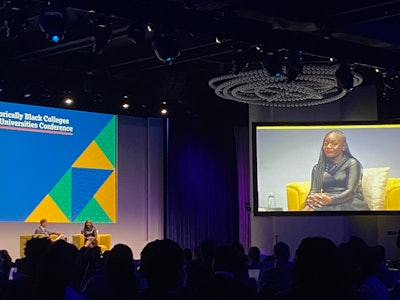NEW YORK –
The second day of the College Board’s Historically Black College and University (HBCU) Conference: "A Dream Deferred" opened with a candid discussion about what it takes to bring more young Black and Brown individuals into the fields of science, technology, engineering and mathematics (STEM), and how Black leaders in these fields are tangibly transforming the lives and livelihoods of the communities they come from.
 Steve Bumbaugh, senior vice president of College and Career Access at the College Board, sits in conversation with Dr. . Kizzmekia S. Corbett-Helaire, assistant professor of Immunology and Infectious Diseases at Harvard University and leading researcher behind the Moderna COVID-19 vaccine.
Steve Bumbaugh, senior vice president of College and Career Access at the College Board, sits in conversation with Dr. . Kizzmekia S. Corbett-Helaire, assistant professor of Immunology and Infectious Diseases at Harvard University and leading researcher behind the Moderna COVID-19 vaccine.
Institutions, including medical and scientific institutions, have treated Black and Brown citizens “terribly over the centuries,” said Corbett-Helaire, which spreads their understandable mistrust.
“I do things differently than what’s typical of a scientist because we just have to. Because that trust is gone, there is no way to rebuild it without communication,” said Corbett-Helaire. “That type of communication has to be intentional, almost so direct that it’s not a wide conversation but targeting conversations.”
Throughout the day, leaders and educators came together to try and bridge the divide between secondary and post-secondary education, creating solid pathways for Black and Brown students to walk toward credentials that provide careers and economic mobility.
A 2023 report by the Annenberg Institute for School Reform, studying almost 1.2 million Black students who took the SAT between 2004 and 2010, revealed that students who enrolled at an HBCU were 14.6 percentage points more likely to graduate than their counterparts. Black students who enrolled at non-HBCU four-year institutions were 24 percentage points less likely to complete a bachelor’s degree in six years or less.





















